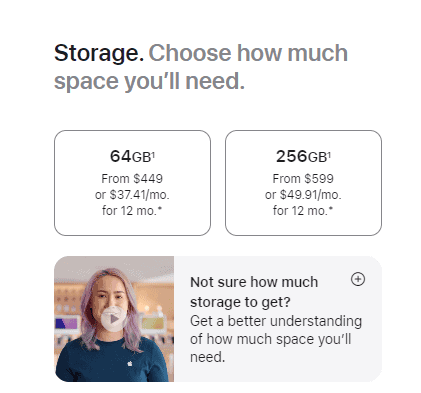Choosing the right iPad involves several important decisions, and one of the most crucial is determining the appropriate storage capacity. Specifically, is 64GB sufficient? The answer varies depending on your individual usage patterns, the type of content you plan to store, and how you anticipate using your iPad.
For basic use—such as browsing the web, checking emails, and using apps like FaceTime—64GB of storage is typically adequate. You can also save a few episodes of a TV show or some playlists from streaming services like Spotify and Netflix, but you’ll need to delete them when you’ve finished.
However, if you wish to download more content, such as movies from Netflix or Amazon Prime Video, you may quickly run out of storage. Additionally, if you plan to use your iPad for more demanding tasks, like saving entire seasons of shows for offline viewing or using a multitude of different apps, you might want to consider an iPad with more storage.
So while 64GB may be enough for very light users, it’s a tight fit for most. The inability to upgrade storage later, combined with the evolving nature of how we use iPads, makes a strong case for considering models with more storage. It’s better to have more space and not need it than to need more space and not have it. Remember, the right choice depends on your specific needs and how you plan to use your iPad.
iPad Storage Considerations: Is 64GB Enough?
Understanding Your Usage
The answer depends largely on your intended use for the iPad. For light users who primarily browse the web, check email, stream videos, and use a few apps, 64GB may be sufficient. However, if you plan to store lots of photos, videos, music, or games, or use demanding apps like video editors, you might find yourself quickly running out of space.
Factors Affecting Storage Needs
- Photos and Videos: High-resolution photos and videos can consume a significant amount of storage.
- Music and Movies: If you prefer to download music and movies for offline use, you’ll need ample storage.
- Games: Many modern games can take up several gigabytes each.
- Apps: While some apps are small, others can be quite large, especially with additional data and updates.
Table: Storage Recommendations Based on Usage
| Usage Type | Recommended Storage |
|---|---|
| Light | 64GB |
| Moderate | 128GB or 256GB |
| Heavy | 256GB or higher |
Tips for Managing iPad Storage
- Utilize Cloud Storage: Services like iCloud, Google Drive, or Dropbox can store files and free up space on your iPad.
- Stream Media: Instead of downloading music and movies, consider streaming them to save storage.
- Regularly Delete Unused Apps and Files: Review your apps and files periodically and delete those you no longer need.
- Optimize Photos: Use features like iCloud Photo Library to optimize photo storage and reduce their size on your device.
Upgrade Options
If you find that 64GB is not enough, you can always upgrade to a model with more storage. However, keep in mind that Apple does not offer expandable storage options for iPads, so choose wisely at the time of purchase.
64GB vs 256GB iPad
| Feature | 64GB | 256GB |
|---|---|---|
| Storage Capacity | 64GB (approximately 53GB usable) | 256GB (approximately 242GB usable) |
| Price | Lower price point | Higher price point |
| Suitable for: | Light users: browsing, email, streaming, casual gaming | Moderate to heavy users: downloading apps and games, storing photos and videos, editing files |
| Typical usage: | Apps: ~20 | Apps: ~70 |
| Photos and videos: ~500 photos, ~2 hours of HD video | ~4,000 photos, ~16 hours of HD video | |
| Offline use: Limited for downloading large files | More flexibility for storing content offline | |
| Future considerations: May need to manage storage more proactively, upgrade earlier | More future-proof, less likely to run out of space |
Additional factors to consider:
- Type of iPad: Storage needs may vary depending on the iPad model (e.g., iPad Pro requires more storage for intensive tasks).
- Cloud storage: Utilize cloud services like iCloud or Google Drive to offload files and free up space.
- External storage: Some iPads support external storage devices for additional space.

Understanding iPad Storage Needs
Firstly, let’s address the elephant in the room: 64GB might be adequate if you primarily stream content and don’t plan on storing a lot of media files or apps. However, this is a very basic usage scenario. For many users, especially those who like to download movies for offline viewing, play games, or use numerous apps, 64GB can quickly become restrictive.
The Evolution of iPad Usage
Over time, the way we use iPads has evolved. They’re no longer just devices for browsing the web or watching videos. Many people use iPads for photography, video editing, drawing, and even as laptop replacements. These activities can consume a significant amount of storage space. High-resolution photos and videos, in particular, can eat up storage rapidly.
The Longevity Factor
Consider the lifespan of an iPad. On average, an iPad can last between five to seven years. During this time, your storage needs are likely to increase. With 64GB, you might find yourself constantly managing storage space, deleting files to make room for new ones. This can be a source of frustration and limit the device’s usefulness over time.
The Cost of Upgrading Later
It’s important to note that iPad storage is not upgradable. Once you choose a capacity, you’re stuck with it for the life of the device. If you find that 64GB isn’t enough, your only option is to purchase a new iPad with more storage, which can be a costly mistake.
The Role of Cloud Storage
Some might argue that cloud storage solutions like iCloud can compensate for limited physical storage. While cloud services are convenient for backup and accessing files across devices, they require a stable internet connection and can incur additional monthly costs.
The Price Factor
Price is a significant consideration. Higher storage models are more expensive, and it’s essential to balance your budget with your needs. However, investing in more storage upfront can be more cost-effective in the long run, especially considering the iPad’s longevity.
Specific Use Cases
- For Casual Users: If you’re a casual user who uses the iPad mainly for web browsing, social media, and streaming content, 64GB might suffice.
- For Students and Professionals: If you’re a student or a professional planning to use the iPad for note-taking, document storage, and educational apps, 64GB can be limiting. You might need to frequently manage your storage or rely heavily on cloud services.
- For Creative Professionals: For artists, video editors, and photographers, 64GB is often inadequate. These users typically need more space for large files and creative apps.
The Future-Proofing Aspect
Technology evolves rapidly, and apps are continually getting larger and more complex. What seems like enough storage today might not be sufficient in a couple of years. Opting for more storage can be a form of future-proofing your investment.







